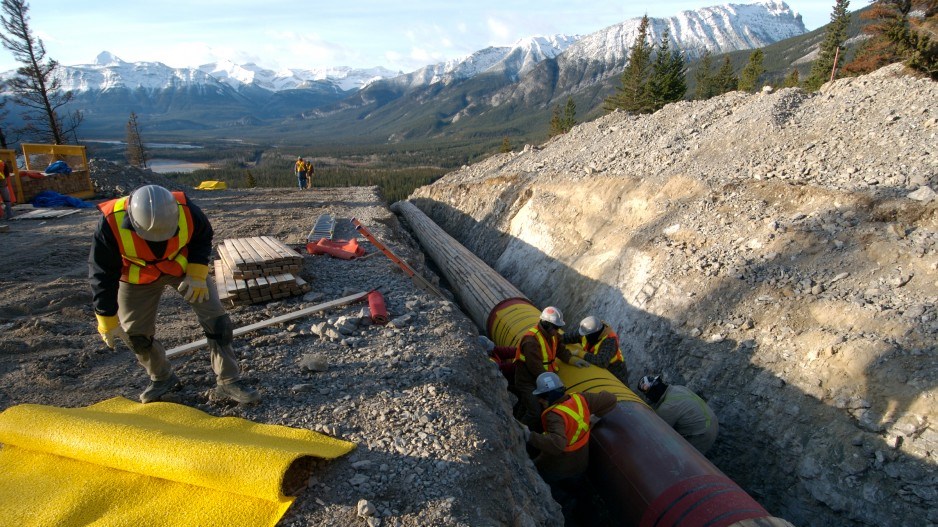By the end of this week, the National Energy Board is expected to make its final recommendations on the controversial Trans Mountain pipeline expansion.
It will then be up to the federal cabinet to decide whether the project can proceed.
On the line is a $7 billion capital project that would generate an estimated $4.5 billion in additional federal and provincial tax revenue during construction over the first 20 years of operation. B.C. would receive $1.6 billion of that revenue.
According to the BC Building Trades Council, the pipeline would employ 4,500 workers at peak construction.
In a last-ditch attempt to stop the expansion project, Rueben George of the Tsleil-Waututh First Nation and two activist groups – Stand (formerly ForestEthics) and SumOfUs, a global corporate watchdog – went to Houston, Texas, to lobby Kinder Morgan Inc. (NYSE:KMI) at a shareholders meeting.
The delegations were able to address shareholders because they were representing two pension funds.
“Long-term shareholders are very concerned about Kinder Morgan’s disregard for local communities,” SumOfUs spokeswoman Lisa Lindsley said in a media teleconference.
George said he made it clear to Kinder Morgan that the Tsleil- Waututh are committed to stopping the project at all costs.
In addition to representing the Tsleil-Waututh, George was speaking on behalf of one of Kinder Morgan’s institutional investors: the New York State Common Retirement Fund.
He asked for a shareholder resolution requiring the company to publish a sustainability report. Shareholders voted against the resolution.
SumOfUs campaigns against large corporations around the world concerning environmental, human rights and workers rights issues.
Last year it was behind a campaign that forced Tim Hortons to pull Enbridge Inc. (TSX:ENB) ads that appeared on TV screens in Tim Hortons stores.
Vivian Krause, a researcher and writer who has delved into the funding of environmental groups by American organizations like the Tides Foundation and Rockefeller Brothers Fund, said SumOfUs is just the latest social justice group to jump on the “tar sands” campaign bandwagon.
Krause, who has traced donations from the Tides Foundation, said roughly $30 million has flowed to First Nations and environmental groups in Canada and the U.S., with much of the emphasis on campaigns against Alberta oil.
She maintains that the many front-line environmental groups receiving funding from large non-profits like the Tides Foundation and Rockefeller Brothers Fund are sincere about their concerns for the environment.
But the fact anti-oilsands campaigns get so much funding suggests to her that the money behind these groups has other motives: protecting U.S. energy independence.
“These same people are doing nothing to slow down Texas, nothing to slow down North Dakota. It’s an American-funded campaign, and they should start in their own backyard.”
A number of environmental groups have provided legal defence funding to B.C. First Nations opposing the Northern Gateway and Trans Mountain pipeline projects.
But not all First Nations in B.C. are opposed to pipelines.
Kinder Morgan says 34 First Nations along the Trans Mountain corridor support the project and have signed benefits agreements.
The most recent one to sign a benefits agreement was the Simpcw First Nation, which, though small in number, occupies a large chunk of traditional territory through which the pipeline passes.
The benefits agreement provides signatories with jobs and contracts. But Simpcw Chief Nathan Matthew said the agreement isn’t just about jobs and economic benefits.
By co-operating with the company, the First Nation has a greater say on things like environmental protection and respecting rights and title.
“What we were interested in was, besides having our rights and title recognized, to make sure we had protections for the environment in the agreement, and that we had the full participation of our First Nation in all aspects of environmental review and decision-making.”
Matthew said he has no issue with other First Nations receiving funding from environmental groups to oppose pipelines and other industrial projects.
“The amount of resources that First Nations get to protect their rights and environment within their traditional lands is really minimal,” he said.
But if Krause’s thesis is correct, it means U.S. organizations are using First Nations in Canada as part of a vanguard in the fight to protect U.S. energy interests.
“Environmentalism is the new protectionism,” she said.




